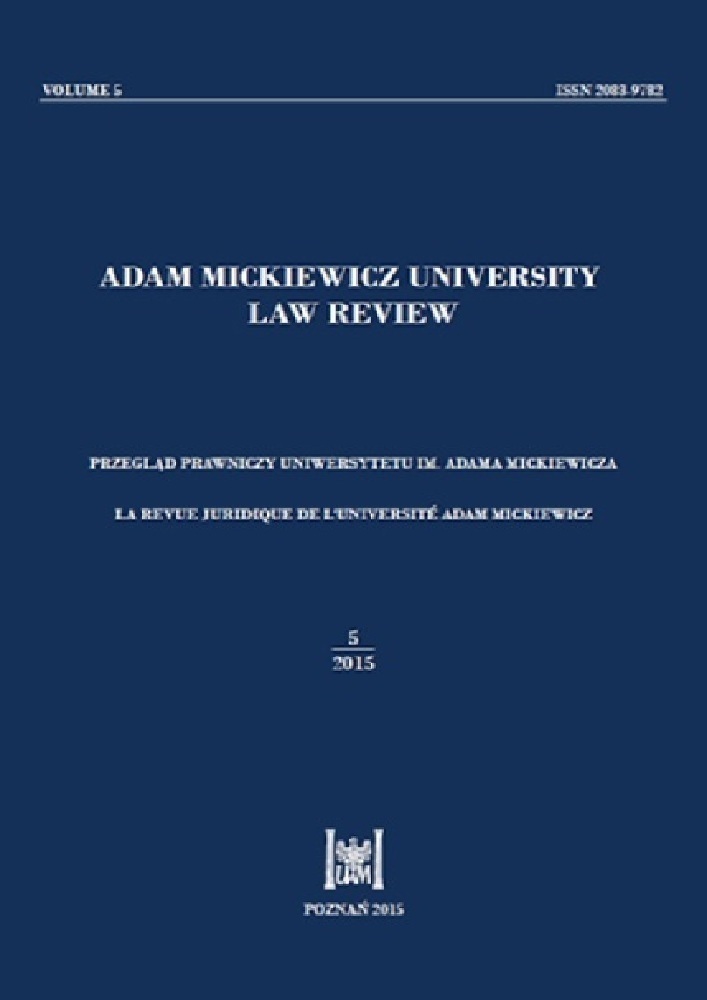Abstract
This article aims to explore the fundamental aspects of the the concept of attributed powers of international organizations. This subject holds significant importance, as attributed powers are related to the very nature of international organizations and their international subjectivity. The author discusses the essence of the attributed powers of international organizations, the doctrinal assessment of this concept, and the selected decisions of international courts that have addressed this issue.
References
Barcz, Jan. “Membership of Poland in the European Union in the Light of the Constitution of 2 April 1997. Constitutional Act on Integration.” Polish Yearbook of International Law, no. 23 (1997–1998): 21–34.
Czapliński, Władysław, and Anna Wyrozumska. Prawo międzynarodowe publiczne. Zagadnienia systemowe. Wydawnictwo C. H. Beck, 2014.
Engström, Viljam. Constructing the Powers of International Organizations. Brill – Nijhoff, 2012. DOI: https://doi.org/10.1163/9789004220317
Engström, Viljam. “Reasoning on Powers of Organizations.” In Research Handbook on the Law of International Organizations, edited by Jan Klabbers and Åsa Wallendahl. Edward Elgar Publishing Limited, 2011.
Engström, Viljam. Understanding Powers of International Organizations: A Study of the Doctrines of Attributed Powers, Implied Powers and Constitutionalism – with a Special Focus on the Human Rights Committee. Åbo Akademi University Press, 2009.
Gadkowski, Andrzej. “The Doctrine of Implied Powers of International Organizations in the Case Law of International Tribunals.” Adam Mickiewicz University Law Review 6, 2016: 45–59. DOI: https://doi.org/10.14746/ppuam.2016.6.03
Gadkowski, Andrzej. “Notes on the Inherent Powers of International Organizations.” Adam Mickiewicz University Law Review 15, 2023: 261–272. DOI: https://doi.org/10.14746/ppuam.2023.15.12
Gadkowski, Andrzej. Treaty-Making Powers of International Organizations. Wydawnictwo Naukowe UAM, 2018.
Kaczorowska, Alina. European Union Law. Routledge, 2011.
Klabbers, Jan. An Introduction to International Organizations Law. Cambridge University Press, 2015. DOI: https://doi.org/10.4337/9781782540953
Reuter, Paul. Institutions internationales. Thémis, 1972.
Reuter, Paul. “Question of Treaties Concluded Between States and International Organizations or Between Two or More International Organizations.” Yearbook of the International Law Commission 2, (1972): 172–199.
Schermers, Henry G., and Niels M. Blokker. International Institutional Law.Brill – Nijhoff, 2011. DOI: https://doi.org/10.1163/ej.9789004187962.i-1273
Seyersted, Finn. Common Law of International Organizations. Brill, 2008. DOI: https://doi.org/10.1163/ej.9789004166998.i-606
Skubiszewski, Krzysztof. “Implied Powers of International Organizations.” In International Law at a Time of Perplexity. Essays in Honour of Shabatai Rosenne, edited by Yoram Dinstein and Mala Tabory. Brill – Nijhoff, 1989. DOI: https://doi.org/10.1163/9789004633704_049
Virally, Michel. “La notion de fonction dans la théorie de l’organisation internationale.” In Charles E. Rousseau, Mélanges offertes à Charles Rousseau. Pedone, 1974.
Weiß, Norman. Kompetenzlehre internationaler Organisationen. Springer, 2009. DOI: https://doi.org/10.1007/978-3-642-03378-0
White, Nigel D. The Law of International Organizations. Manchester University Press, 2005.
Wyrozumska, Anna. “Państwa członkowskie a Unia Europejska.” In Prawo Unii Europejskiej. Zagadnienia systemowe, edited by Jan Barcz. Wydawnictwo Prawo i Praktyka Gospodarcza, 2006.
The case S.S. ‘Wimbledon’, PCIJ Publications 1923, Series A – No. 1.
The case of the S.S. ‘Lotus’, PCIJ Publications, 1927, Series A – No. 10.
Competence of the ILO in Regard to International Regulation of the Conditions of the Labour of Persons Employed in Agriculture, PCIJ Publications 1922, Series B – No. 2.
Competence of the ILO to Examine Proposals for the Organization and Development of the Methods of Agricultural Production, PCIJ Publications 1922, Series B – No. 3.
Competence of the ILO to Regulate Incidentally the Personal Work of the Employer, PCIJ Publications 1926, Series B – No. 13.
Legality of the Use by a State of Nuclear Weapons in Armed Conflict, Advisory Opinion, ICJ Reports 1996.
Jurisdiction of the European Commission of the Danube between Galatz and Braila, PCIJ Publications 1927, Series B – No. 14.
Reparation for Injuries Suffered in the Service of the United Nations, Advisory Opinion: ICJ Reports 1949.
License
Copyright (c) 2024 Andrzej Gadkowski

This work is licensed under a Creative Commons Attribution 4.0 International License.

